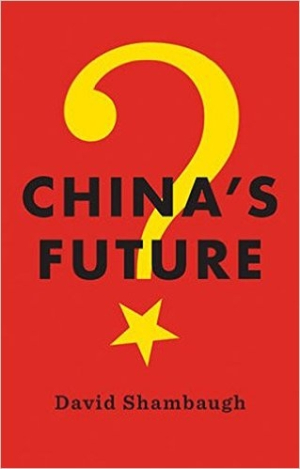China's Future
Shambaugh’s criticisms are usually well couched and backed up with sound arguments, making this book worthwhile even for skeptics.
In discussing the future of China, this brief but thorough book outlines the problems with China’s current political model, the nation’s potential strengths, and possible methods by which China may capitalize on those strengths. It describes four major political outcomes, ranging from neo-totalitarianism to semi-democracy, whose impact will affect every aspect of Chinese life.
Though he does acknowledge positive changes, such as environmental reforms that have turned China into a leading producer of solar energy, Shambaugh comes down much harder on the negatives of China’s social state of affairs, economy, and government. These he ties back to China’s governmental system, claiming that the current state of hard authoritarianism is limiting innovation, exacerbating existing social tensions, and preventing economic growth. The author’s assessment of Chinese higher education is particularly harsh, highlighting Chinese censorship as a factor in stunted research and development. The answer, according to Shambaugh, is a “soft” democracy that is more in line with Western models. Since the author is himself American, it is possible that some sectors will consider the book biased. However, Shambaugh’s criticisms are usually well couched and backed up with sound arguments, making this book worthwhile even for skeptics.
While it is not necessary to be a political scientist to understand and enjoy China’s Future, knowledge of certain aspects of Chinese everyday life, such as the existence of the Great Firewall and the internal national controversy over Tibet and Xinjiang, can improve enjoyment of the text. Informed by years of life in and interaction with Chinese society, Shambaugh brings a great deal of personal experience to his assessment of China. However, he also consistently includes statistics and references that come in very handy, and the extensive notes and index round out this book as a useful source of information about China in general.
Political scholars are likely to find China’s Future interesting and stimulating, especially if they already hold their own opinions about China’s status and future. The book is likely to excite considerable debate in both Chinese and global circles.
Reviewed by
Anna Call
Disclosure: This article is not an endorsement, but a review. The publisher of this book provided free copies of the book to have their book reviewed by a professional reviewer. No fee was paid by the publisher for this review. Foreword Reviews only recommends books that we love. Foreword Magazine, Inc. is disclosing this in accordance with the Federal Trade Commission’s 16 CFR, Part 255.

